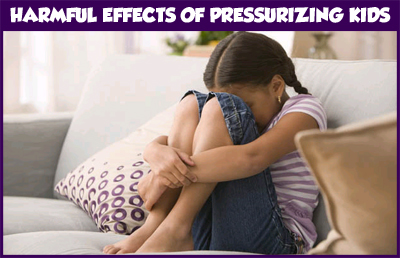
Children are brought-up with their parents’ expectations behind them always reminding them to stay organized, well-behaved and get high grades so that their future gets secured. Read on to learn the signs and effects of pressurizing kids.Pressure by parents to achieve high scores or perform well has created stress levels among children. Since the society in which we live today is very demanding and challenging, the pressure starts as early as in elementary school.
Well, this does not mean that you leave your kids to grow and learn on their own. In fact, setting high expectations for kids is not necessarily bad. The main thing is to find out how your child is taking the pressure and whether he is capable of handling things or not. The pressure should not have negative impact on the child.
How Do Children Get Pressurized?
Do you put too much pressure on your children? It is good to provide encouragement without causing them more stress that they can handle. Here are some signs that will make you aware whether you are over pressurizing your kids along with strategies to communicate better with your child.
1. When Parents Get Upset
When your child fails to achieve the target set, do you get anxious, mad or depressed? If yes, you should take care of your emotional needs also.
Approach – Take some time out and communicate with your child daily. Get aware of what your child is studying, whether he completes his homework on time or not, whether he participates in extracurricular activities or not and show your interest in what your child is doing.
2. When Parents Argue
There are many areas on which husbands and wives argue, but when it is often on the child’s success rate, it is not healthy for the child.
Approach – Think positively and support your kid. Encourage him, get involved and make the success of your kid teamwork. Workout strategies and implement them so that you can help your child to do his best. And never
fight in front of a child.
3. Constantly Giving Negative Feedback
If your kid did something wrong in the past, constant nagging will not have any good effect. Also, if the examination was tough and your child achieves a ‘B’ grade and you show your unhappiness because he did not get ‘A’ grade, wrong message will get conveyed.
Approach – Praise the effort of your child. If you think that your child did not put in his best, show him the points where he should work harder and achieve better next time. Discuss his style of studying and try to improve it.
4. When Parents Take All Decisions
Children like to take small and big decisions on their own, but if you make the rules and take many of the decisions, your child will be stifled.
Approach – Remember, when children practice making independent decisions, they learn to grow and make healthy choices when they approach a good opportunity.
5. When your Child is Over Programmed
Most of the parents engage their children into different classes and activities after school leaving them with almost no free time. These activities are often based on the interests of the parents and not the children.
Approach – Children need some time for themselves in which they can do what they like. This helps them in healthy development and makes them understand their personalities and natural strengths as well.
Harmful Effects of Pressurizing Kids
Have a quick look at the ill-effects of pressurizing kids.
Lack of Interest
A consequence of academic stress is that students start losing interest in school. They lose their motivation to learn.
Physical and Emotional Distress
When kids shove their health and well-being aside to cope and uphold academic expectations, they face physical and emotional distress and this adds even more stress to the environment that is already full of stress.
Poor Sleep
One of the dangerous results of stress and procrastination is poor sleep. This has direct impact on studies and affects the academic capability of kids. Adequate sleep at night relaxes mind and body and rejuvenates the kid to handle things effectively during the day. On the other hand, inadequate sleep leaves the child exhausted.
Anxiety and Depression
When children are over pressured they become anxious and if they are unable to keep up to the expectations of their parents, they develop depression. Feelings like ‘you are no good at anything’ start propping in mind. Depression leads to more stress and this negatively affects the child’s overall development and performance.
Lack of Participation in Other Activities
Over pressure on kids can make them drop participating in extracurricular activities and in this way they give up things they love to do.
Stress and Exhaustion
Pressure from parents and peers leave children lose their fervour and aspirations and students are left burnt out and exhausted.
Apart from the above effects, emotional and academic stress also causes health problems, making it harder for them to enjoy school and their lives as well. However, the key to success in parenting is to maintain the balance and communication whereas catering each child based on his individuality. Balancing academic endeavours along with social and extracurricular activities is crucial.
What are the causes of stress and depression in kids? How to avoid putting pressure on kids? How to help kids to deal with pressure and avoid stress easily? Discuss here.




